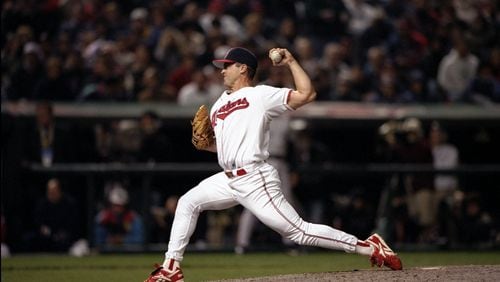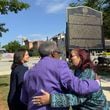Jim Poole played a major role in what was perhaps the four best years Georgia Tech baseball has ever seen. Today, his high school tutelage of Tech’s top two pitchers will have a lot to do with how the current team fares in the NCAA baseball regionals.
As the pitching coach at Johns Creek High School, Poole mentored pitchers Brandon Gold and Mathew Gorst. Both juniors and prospects for next week’s MLB draft, Gold was 8-3 with a 2.83 ERA during the regular season while Gorst had 12 saves and allowed just two earned runs in 44 1/3 innings (0.41 ERA).
Poole has been instrumental in their success. But at the beginning, baseball was secondary for Poole, who Braves fans will remember as the Cleveland Indian who gave up the game-winning home run to David Justice in Game 6 of the 1995 World Series.
Born in Rochester, N.Y., he moved to Philadelphia at a young age and went to La Salle College High School, where he won just two games as a starter.
He had been a left-handed catcher as a freshman year before beginning to pitch as a sophomore. La Salle did not a strong program. Poole had his eye on an engineering degree.
Poole signed with Tech and coach Jim Morris at a special time in 1985, the first of four straight ACC Tournament championships. The Yellow Jackets were loaded with talent including starting pitcher Kevin Brown, outfielder Ty Griffin and two-sport star Riccardo Ingram.
Always a hard worker, Poole excelled in school and while coming out of Tech’s bullpen to pitch in 120 games, striking out 263 in 188 innings. He caught the attention of the Los Angeles Dodgers his junior season and was taken in the 34th round of the 1987 draft.He decided to return to Tech for his senior season, finishing with a 2.03 ERA and 113 strikeouts in 71 innings. This time, the Dodgers took him in the ninth round and less than two years later, he made his major league debut at Dodger Stadium, his first appearance caught by Rick Dempsey with Hall of Famer Tommy Lasorda in the dugout.
Poole didn’t stick with the Dodgers. He was traded to the Rangers after the 1990 season before going to Baltimore where he had his best major league season in 1993, pitching in 55 games with a 2.15 ERA. After the ’94 season, he was granted free agency and signed with the Indians.
The Indians found a home for Poole. He became their key middle reliever for two years, though one of his few mistakes was the pitch he left out over the plate to Justice in ’95, which would be the only run in the Braves’ title-clinching game in the Series.
Poole next went to the Giants in 1997 before coming back to the Indians in July ’98, pitching in both the divisional series and the league championship against the Yankees. He did not allow a run in six postseason appearances.
But a sore elbow that had been bothering him since ’95 started giving him real trouble and would eventually require surgery. He was able to pitch in 51 games for hometown Philadelphia in 1999 but finished his career a year later.
Off the field, Poole has always been busy. He finished off his electrical engineering degree from Tech in 1990, has served on the MLB pension committee since 1993 and opened Grand Slam Sports, a baseball instructional center in Alpharetta. He was a founding member of the Buckhead Investment Partners, LLC., taught math at Johns Creek and remains their pitching coach, continuing to bring along pitchers like Gold and Gorst. He is also in the Georgia Tech Athletic Hall of Fame.
Where he lives: Poole, now 50, lives with his wife of 26 years, Kim, in Johns Creek. They have two sons, Austin and Hayden, and daughter Courtney.
What he does: He just went back to work for Buckhead Investment Partners and remains active as an advisor on the MLB pension committee.
On coaching in high school: "It has been an awesome experience, getting a chance to watch 14-year-old boys grow into 18-year-old young men. It reminds me that there is a lot of good still left. As far as Mathew and Brandon, no surprise there. They have always been talented young men and have also had the passion to take care of their business and succeed and as a Tech alum, I love it.''
On coming to Tech: "We were not a good team in high school and I wasn't much better. Tech was losing a bunch of pitchers and I begged them for some scholarship money. They gave me $500. I went to Tech to be an engineer.''
On his success with the Yellow Jackets: "What they did was let me compete and I can't tell you how coming to a school like Tech made a difference for me when I went to pro ball. I knew I was going to get an engineering job and have a nice career if I didn't make it. A lot of other players didn't have something like that. They had a lot more pressure on them than I did.''
On being drafted by the Dodgers twice: "The first time, I think it was just to see how I would react to it. You have to understand. I grew up in Philly and the Dodgers were always a thorn in our side. Then all of a sudden, I am with this organization that has Fernando Valenzuela, Orel Hershiser, Eddie Murray and Kirk Gibson.''
On his debut at Dodger Stadium: "We are playing the Padres and I thought I was going to get called into to pitch to Tony Gwynn. But I got to the mound to start the inning and I see (catcher) Rick Dempsey behind the plate talking to the umpire. I think the umpire asked Rick what does this kid have and Rick says he doesn't even know who I am.''
On signing with the Indians: "After the 1994 season, I had a chance to go to Oakland or Cleveland. It was the strike year and the Indians were exciting. Their whole lineup was either All-Stars or Hall of Famers. What great timing.''
On playing the Braves in '95: "We thought we were going to win the Series but I think what happened was we had some younger players that weren't prepared for the noise that comes with the postseason.''
On playing for then-Indians GM John Hart, now with the Braves: "I liked him and he was very personable. There were a lot of players that had young families and he always welcomed them. He was a lot about offense, having a strong bullpen and bringing in veteran starters.''
On wearing a hometown Phillies uniform: "I remember the first game I pitched for them was against the Marlins and I came off the field hearing Harry Kalas in my head doing the game. It was the same guy broadcasting the game when I was young listening to the Phillies on a transistor radio. It was living out a dream.''
About the Author






